Serving 178 students in grades Prekindergarten-8, Weymouth Township Elementary School ranks in the bottom 50% of all schools in New Jersey for overall test scores (math proficiency is top 50%, and reading proficiency is top 50%).
The percentage of students achieving proficiency in math is 35-39% (which is approximately equal to the New Jersey state average of 36%). The percentage of students achieving proficiency in reading/language arts is 45-49% (which is approximately equal to the New Jersey state average of 49%).
The student:teacher ratio of 11:1 is equal to the New Jersey state level of 11:1.
Minority enrollment is 20% of the student body (majority Hispanic), which is lower than the New Jersey state average of 62% (majority Hispanic).
Quick Stats (2025)
- Grades: Prekindergarten-8
- Enrollment: 178 students
- Student:Teacher Ratio: 11:1
- Minority Enrollment: 20%
- Overall Testing Rank: Bottom 50% in NJ
- Math Proficiency: 35-39% (Top 50%)
- Reading Proficiency: 45-49% (Btm 50%)
- Science Proficiency: ≤10% (Btm 50%)
- Source: National Center for Education Statistics (NCES), NJ Dept. of Education
Top Rankings
Weymouth Township Elementary School ranks among the top 20% of public schools in New Jersey for:
Category
Attribute
Community Size
Student Attention
School Overview
Weymouth Township Elementary School's student population of 178 students has grown by 7% over five school years.
The teacher population of 16 teachers has grown by 6% over five school years.
Grades Offered
Grades Prekindergarten-8
Total Students
178 students
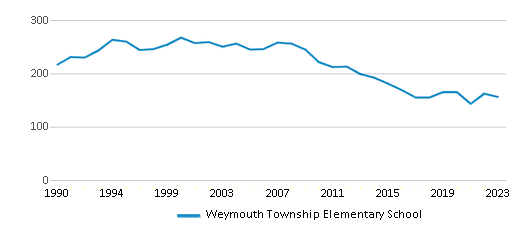
Gender %
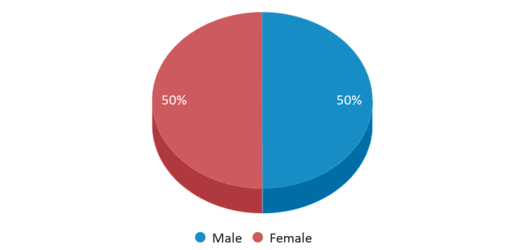
Total Classroom Teachers
16 teachers
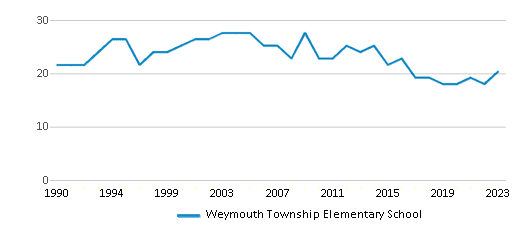
Students by Grade
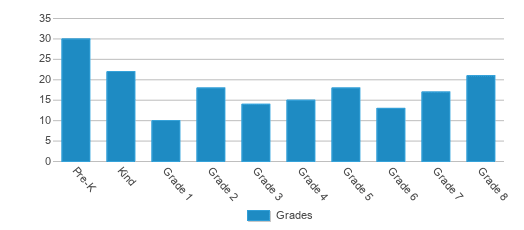
School Rankings
Weymouth Township Elementary School ranks within the bottom 50% of all 2,201 schools in New Jersey (based off of combined math and reading proficiency testing data).
The diversity score of Weymouth Township Elementary School is 0.35, which is less than the diversity score at state average of 0.72. The school's diversity has stayed relatively flat over five school years.
Overall Testing Rank
#1105 out of 2201 schools
(Bottom 50%)
(Bottom 50%)
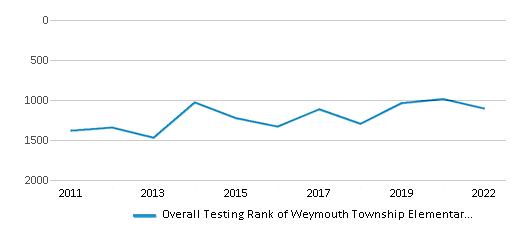
Math Test Scores (% Proficient)
35-39%
36%
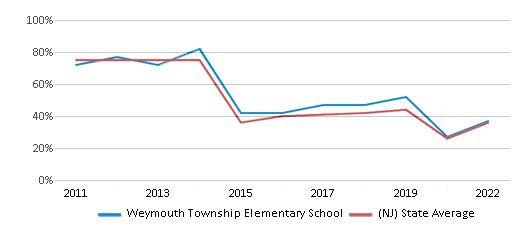
Reading/Language Arts Test Scores (% Proficient)
45-49%
49%
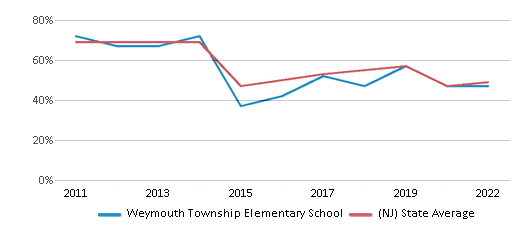
Science Test Scores (% Proficient)
≤10%
23%
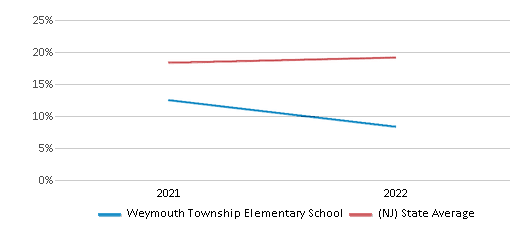
Student : Teacher Ratio
11:1
11:1
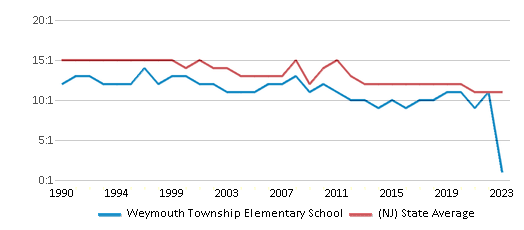
American Indian
n/a
n/a
Asian
2%
10%
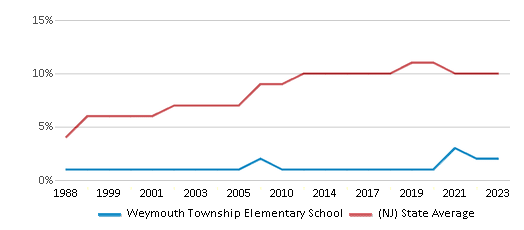
Hispanic
12%
34%
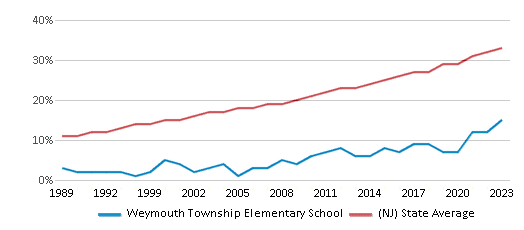
Black
2%
15%
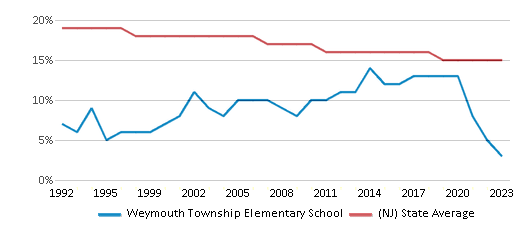
White
80%
38%
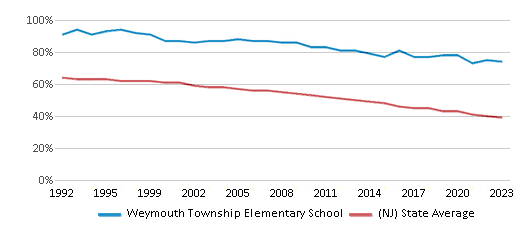
Hawaiian
n/a
n/a
Two or more races
4%
3%
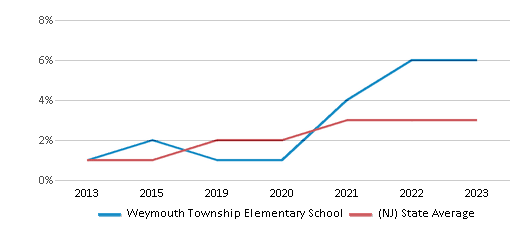
All Ethnic Groups
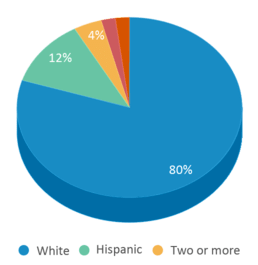
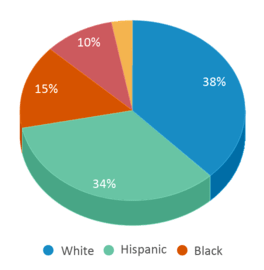
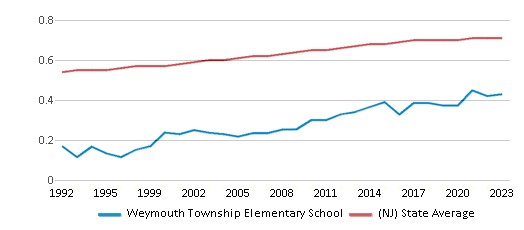
Eligible for Free Lunch
31%
32%
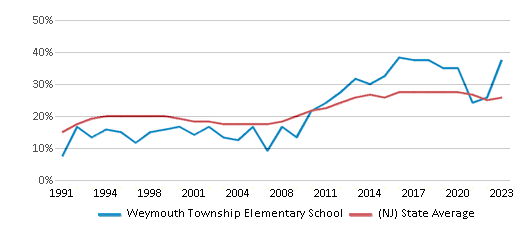
Eligible for Reduced Lunch
8%
6%
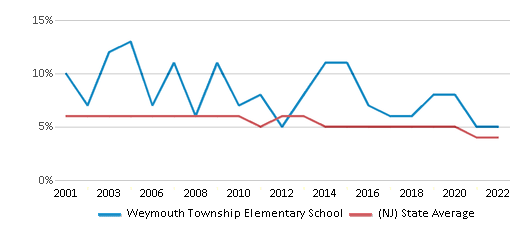
School Statewide Testing
School District Name
Source: National Center for Education Statistics (NCES), NJ Dept. of Education
Profile last updated: 02/09/2025
Frequently Asked Questions
What is Weymouth Township Elementary School's ranking?
Weymouth Township Elementary School is ranked #1105 out of 2,201 schools, which ranks it among the bottom 50% of public schools in New Jersey.
What percent of students have achieved state testing proficiency in math and reading?
35-39% of students have achieved math proficiency (compared to the 36% NJ state average), while 45-49% of students have achieved reading proficiency (compared to the 49% NJ state average).
How many students attend Weymouth Township Elementary School?
178 students attend Weymouth Township Elementary School.
What is the racial composition of the student body?
80% of Weymouth Township Elementary School students are White, 12% of students are Hispanic, 4% of students are Two or more races, 2% of students are Asian, and 2% of students are Black.
What is the student:teacher ratio of Weymouth Township Elementary School?
Weymouth Township Elementary School has a student ration of 11:1, which is equal to the New Jersey state average of 11:1.
What grades does Weymouth Township Elementary School offer ?
Weymouth Township Elementary School offers enrollment in grades Prekindergarten-8
What school district is Weymouth Township Elementary School part of?
Weymouth Township Elementary School is part of Weymouth Township School District.
School Reviews
2 12/17/2016
Their are both positives and negatives to this school. The MAJOR positive is that their is that small town feel so you always feel like your child is getting what they need from the teachers. Often the classes are so small it can feel like your child has 1:1 attention. Everyone knows your child and your child is comfortable with everyone in their school, from the principal down to the custodial staff everyone knows the kids and that is very nice. The down side can also be that it's very small. Every class is small (for example almost every grade only has the one class for that grade) so if your child doesn't have a lot in common with those in their grade it's not like they can just find other kids their age in another classroom to hang out with. If you have 10 kids in First grade than that's it! They are connected to those 10 kids. Also it seems like several of the families here have grown up in Weymouth so they have family connections. As a Weymouth transplant it's difficult to cut through those ties. I often feel like an outsider because I don't know the locals and don't have those local ties also some of these parents also went through this school and know the staff from when they were kids. So trying to merge into the already established school community is sometimes tough. I do think the school is active in obtaining money from the state and allowing for high tech and special events to come to the school for their students so I do feel my child is getting a good education and that's most important.
Review Weymouth Township Elementary School. Reviews should be a few sentences in length. Please include any comments on:
- Quality of academic programs, teachers, and facilities
- Availability of music, art, sports and other extracurricular activities
Recent Articles

What Is A Charter School?
Explore the world of charter schools in this comprehensive guide. Learn about their history, how they operate, and the pros and cons of this educational innovation. Discover key facts about charter schools, including admission policies, demographics, and funding, as well as what to look for when considering a charter school for your child.

10 Reasons Why High School Sports Benefit Students
Discover the 10 compelling reasons why high school sports are beneficial for students. This comprehensive article explores how athletics enhance academic performance, foster personal growth, and develop crucial life skills. From improved fitness and time management to leadership development and community representation, learn why participating in high school sports can be a game-changer for students' overall success and well-being.

February 05, 2025
Understanding the U.S. Department of Education: Structure, Impact, and EvolutionWe explore how the Department of Education shapes American education, from its cabinet-level leadership to its impact on millions of students, written for general audiences seeking clarity on this vital institution.





